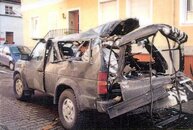A failed VIP only means "you don't get a sticker".
You can take the tank somewhere else if you wish.
A failed Eddy Current Test that showed real neck cracks during a VIP would be an interesting case and I'm not sure what happens then, except that I'm certain it wouldn't get filled, and I don't believe I know any tank owners dumb enough to continue using a tank after you show them the neck crack. It's not a subtle test that involves a lot of interpretation.
If you don't trust the tester, you should be taking your tank somewhere else for a hydro.
flots
My experience in OZ where a tank fails a hydro, the use a chisel on the O ring seat and thread so the valve cannot be put back in. In one case, prior to that, a LDS used to drill a hole in the tank. When he got one back with a threaded bolt screwed in and ground off and taped over, he stopped that approach and uses the chisel on the top and thread.




